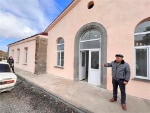
In his opening remarks to the two events on November 1 and November 7, Werner Thut, Deputy Head of Mission of the Swiss Embassy in Armenia and also responsible for the Swiss Cooperation program South Caucasus in Armenia, recalled some fundamental conditions for success in this field. “We have learned from our own Swiss experience: territorial and institutional reforms take time and patience.” But the fruits of the labor are worth it: “Decentralized governance structures offer favorable conditions for democracy, accessible and efficient institutions and sustainable economic development. Especially for mountainous countries like Switzerland and Armenia.”







